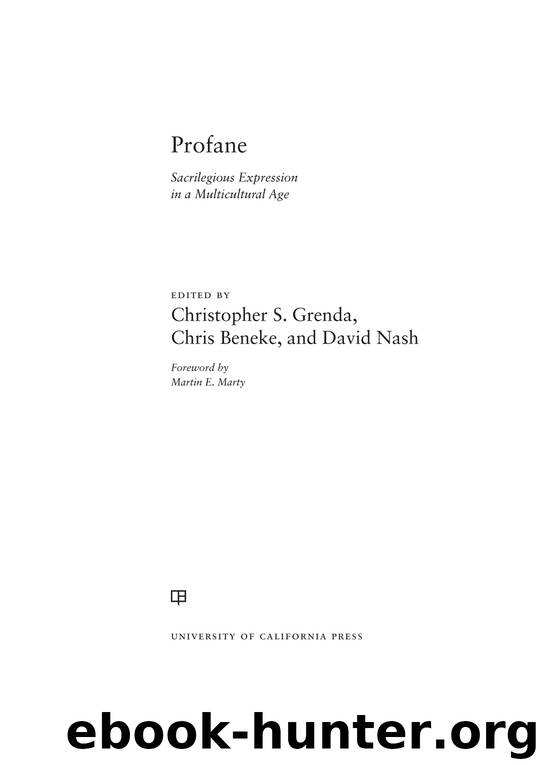Profane by Grenda Christopher S

Author:Grenda, Christopher S.
Language: eng
Format: epub
ISBN: 9780520277229
Publisher: University of California Press
BLASPHEMY AND ANATHEMA IN ISLAM
Blasphemy as a media term is widely used to describe restrictions and limits evident in passionate intra-Muslim arguments or as Muslim disapproval of the ways in which Islam is portrayed. Bear in mind that in Western moral philosophy and theology, this term covers a variety of things. Any “profane speaking of God or sacred things” or any kind of “impious irreverence” or “reproach of a sacred figure” constitutes blasphemy.15
The Muslim discursive tradition uses several terms to signal the violation of doctrinal boundaries and teachings. Muslim theology tolerates disagreement within acceptable discursive boundaries. But when a disagreement is construed as tantamount to a rejection of an a priori doctrine of Islam, then it triggers charges of anathema (takfīr) for the author or holder of such offensive views.16 In both the premodern and modern periods, theological and doctrinal adversaries hurled this highly injurious epithet at one another as contentious groups and individuals contested meaning and authority. Tradition counsels caution in order to restrict the use of mutual anathematizing to instances of necessity only. Yet a reader of the writings of modern traditional Muslim authorities will note the widespread use of the anathema label to silence dissent among rival groups of ‘ulamā and among their non-‘ulamā rivals. Surely the use of the rhetoric of anathema fragments the moral consensus among Muslims. Yet it nevertheless creates discursive tension among Muslims and foments a vibrant religious public sphere, provided such debates do not spill over into violence. When some of these disagreements are contested in modern secular courts, then the discursive disagreements mutate into political offenses and the perpetrator, if found guilty, is viewed as a criminal. This was true in the case of Maḥmūd Muḥammad Ṭāhā of Sudan, Naṣr Ḥāmid Abū Zayd of Egypt, and other individuals who were prosecuted for theological offenses in secular courts in the twentieth century.17
Download
This site does not store any files on its server. We only index and link to content provided by other sites. Please contact the content providers to delete copyright contents if any and email us, we'll remove relevant links or contents immediately.
The Lost Art of Listening by Michael P. Nichols(6474)
Why I Am Not A Calvinist by Dr. Peter S. Ruckman(3771)
The Rosicrucians by Christopher McIntosh(3049)
Wicca: a guide for the solitary practitioner by Scott Cunningham(2705)
Signature in the Cell: DNA and the Evidence for Intelligent Design by Stephen C. Meyer(2501)
Real Sex by Lauren F. Winner(2476)
The Holy Spirit by Billy Graham(2418)
To Light a Sacred Flame by Silver RavenWolf(2353)
The End of Faith by Sam Harris(2290)
The Gnostic Gospels by Pagels Elaine(2027)
Nine Parts of Desire by Geraldine Brooks(2007)
Waking Up by Sam Harris(1958)
Heavens on Earth by Michael Shermer(1955)
Devil, The by Almond Philip C(1899)
Jesus by Paul Johnson(1887)
The God delusion by Richard Dawkins(1848)
Kundalini by Gopi Krishna(1824)
Chosen by God by R. C. Sproul(1760)
The Nature of Consciousness by Rupert Spira(1689)
